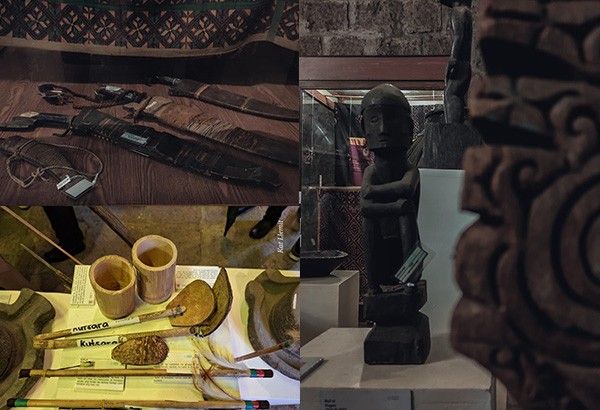Nayong Pilipino Foundation brings 150 'artifacts' to Quezon traveling museum

MANILA, Philippines — Despite not having its own park at the moment, Nayong Pilipino Foundation (NPF) has found a way to bring its "artifacts" closer to Filipinos.
In fact, it has staged for the fifth time its traveling museum featuring "artifacts" from all over the Philippines to the Mayohan Festival capital of Tayabas in Quezon Province.
Over 150 artifacts, mostly in line with its "harvest" theme, are displayed from May 15 to June 15 at the historic stone building Casa Communidad de Tayabas.
On the ground floor of the Spanish colonial era, two-storey building, agricultural tools such as woven baskets and bags, wooden kitchen utensils and hunting gear of early Filipinos are displayed. Textiles from Luzon, Visayas and Mindanao are also on view. The noticeably popular Cordilleran sculpture, bul-ols, are also on display.
NPF Executive Director Gertie Duran-Batocabe said their traveling museums have always been thematic, depending on their partner institutions.
In the case of the Tayabas, Quezon exhibit, it was conceptualized to complement the Mayohan Festival, Tayabas' own commemoration of the feast of San Isidro Labrador, the patron saint of peasants, farmers and agricultural workers.
The feast of San Isidro Labrador is celebrated every May 15 in many Quezon provinces, notably Tayabas and nearby Lucban with its own Pahiyas Festival.
"Ba't hindi natin ilapit 'yung aming mga artifacts?" said Batocabe to Philstar.com at the launch of the exhibit in Tayabas.
"With that we thought of the traveling museum in such a way ilapit ang mga artifacts na dating nakatago sa storage room namin sa mga tao? Don't you think it's so practical?" she added.
Currently in their inventory, which is "approved" by the Commission of Audit, are 3,000 artifacts.
"Right now na kailangan talaga ma-educate ang mga millennials and Gen Zs about our very rich cultural heritage, ito ang naisipan namin," she noted.
Right terms
While Duran-Batocabe has been saying artifacts, she said that there were proper terms to attribute these.
"Ang tawag namin dito actually ay hindi artifacts, kung hindi cultural materials," the NPF executive director shared.
She said that she was advised by their curators to be precise in referencing historical materials.
"Artifacts daw kasi ay 'yung mga nahango sa excavation. Artifacts is just a part of cultural materials," she explained.
She also added that while it is common for many to use "tribes," meaning the Tagalogs, Bisaya, etc., it is more proper to refer to them as ethnolinguistic groups.
As an government-owned and controlled corporation (GOCC) and attached agency of the Department of Tourism, NPF has a mandate to promote culture and heritage.
It was created on November 6, 1972 under Presidential Decree 37, and is mandated to champion the Filipino identity by developing parks and research projects, among others.
The agency celebrated its 50th year last November 2022 by launching the exhibition “(Ka)Loob(an)” at Fort Santiago’s IVC Teatro in Intramuros. It opened its theme park in 1972 with the help of then First Lady Imelda Marcos.
The theme park was first situated near Manila International Airport but it was closed in 2002 under Executive Order 111 to give way to the airport’s expansion. It was then moved to Clark, Pampanga.
The plan to build a new Nayong Pilipino park in Parañaque City for P2 billion has been put on hold because of the COVID-19 pandemic.
The exhibit was made possible through the NPF’s partnership with Oplan Sagip Tulay (OST) Tayabas and the Local Government of Tayabas.
RELATED: P2 billion Nayong Pilipino project on pandemic hold



















